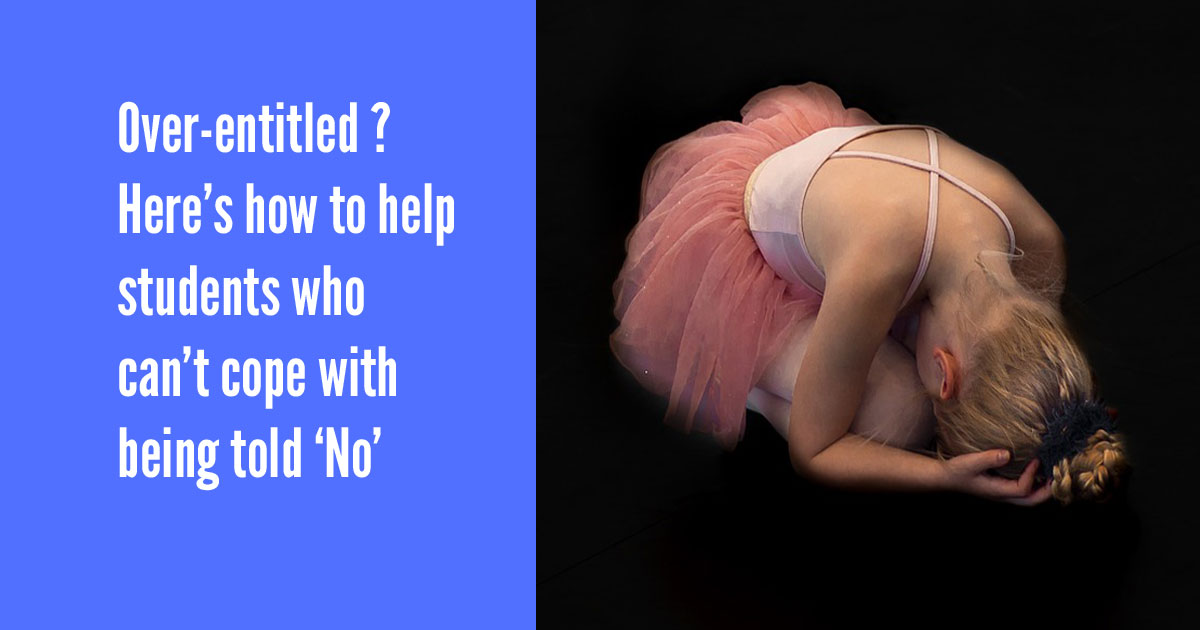Ungrateful. Entitled. Fragile.
We’ve all taught children unable to cope with minor disappointments. Kids who melt down when they’re told ‘no’ or asked to correct their work.
The cause? Most likely, it’s over-parenting.
Parents who, with the best of intentions, over-protect and over-pamper.
The result? A pupil with paper-thin resilience who can’t cope when life doesn’t go their way. (Or, of course, they meet an adult imposing a boundary…)
So – is there anything we can do to help the child who cannot cope with ‘no’?
Here are 3 practical ideas.
1. Make sure this is about entitlement
The first thing to ask when confronted by any inappropriate behaviour is… what’s causing this?
Is entitlement causing the student’s behaviour – or is something else going on?
Here are some things to check.
In her article, Are you enabling ‘academic entitlement’ in students?, Sarah Sparks suggests you look out for the following student attitudes:
- knowledge is a right – and should involve no discomfort on my part
- a good result shouldn’t come from my hard work and effort, but from the simple fact I turned up to school
- if I didn’t do well on a test, the test was too hard (or the teacher covered the wrong material beforehand)
In her book, The Me, Me, Me Epidemic, Amy McCready also suggests many other telltale signs. Here are some key ones:
- the child passes blame for their own mistakes…
- …and expects the adult to rescue them from their mistakes
- are unable to handle disappointment
- act as if the rules don’t apply to them
- expects a bribe for effort shown or good behaviour
2. Avoid upping rewards for compliance
Extrinsic motivators are rewards/bribes we give to students to encourage them to change their behaviour.
The problem with using rewards with entitled students is that the reward soon becomes… another entitlement.
Your relationship has become transactional – based on tit-for-tat. I’ll give you this, if you do that.
Another issue is, over time, the reward naturally becomes less interesting, less motivating. So the pressure will be to find something extra, something more, to motivate the student.
And if the reward is ever withdrawn? The student offers greater resistance.
“But I used to get time on the iPad for finishing my writing! So why should I do it now?”
And so the cycle continues.
Instead of upping rewards, explain why it is in the student’s self-interest to complete the task. Relate it to:
- their personal interests
- an ability they want to develop
- a skill they need for a possible future career etc.
This helps your pupil develop an intrinsic desire to do the right thing. In essence, “I behave in a certain way because it’s worth doing – in and of itself.”
3. Teach them to be grateful
There’s growing evidence that keeping a gratitude journal has a significant impact on how we see the world.
Students who are entitled need help to change their attitude from “I deserve…” to “I’m grateful for…”
A simple way of doing this is asking the student to spend 5 minutes every day completing a gratitude diary.
In the diary, they record 3 things they’re thankful for from the school day.
These should be specific events/thoughts from the day (“I enjoyed using the paints this afternoon”) – rather than a general statement about their life (“I have a nice bedroom.”)
Entitled students often have a negative outlook, scanning the world for challenges to things they ‘have a right to.’ Completing a daily gratitude journal rewires that focus. It gets them into the habit of scanning the world for things that they should be thankful for.
There is also evidence to show keeping a gratitude journal leads to greater personal happiness, a better ability to cope with disappointment and increased psychological resilience in general.

